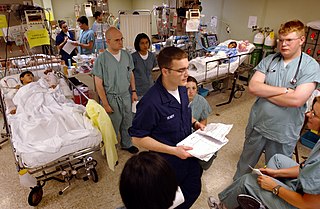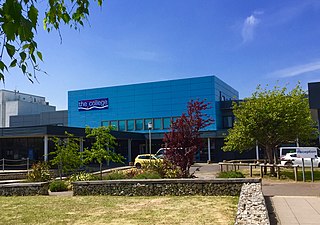Related Research Articles

The American National Standards Institute is a private nonprofit organization that oversees the development of voluntary consensus standards for products, services, processes, systems, and personnel in the United States. The organization also coordinates U.S. standards with international standards so that American products can be used worldwide.

Biomedical engineering (BME) or medical engineering is the application of engineering principles and design concepts to medicine and biology for healthcare applications. BME is also traditionally logical sciences to advance health care treatment, including diagnosis, monitoring, and therapy. Also included under the scope of a biomedical engineer is the management of current medical equipment in hospitals while adhering to relevant industry standards. This involves procurement, routine testing, preventive maintenance, and making equipment recommendations, a role also known as a Biomedical Equipment Technician (BMET) or as a clinical engineer.
The Science Council is a UK organisation that was established by Royal Charter in 2003. The principal activity of The Science Council is the promotion of the advancement and dissemination of knowledge of and education in science pure and applied, for the public benefit. The Science Council is the Competent Authority with respect to the European Union directive 2005/36/EC. It is a membership organisation for learned and professional bodies across science and its applications and works with them to represent this sector to government and others. Together, the member organisations represent over 350,000 scientists. The Science Council provides a forum for discussion and exchange of views and works to foster collaboration between member organisations and the wider science, technology, engineering, mathematics and medical communities to enable inter-disciplinary contributions to science policy and the application of science.
Engineering management is the application of engineering methods, tools, and techniques to business management systems. Engineering management is a career that brings together the technological problem-solving ability of engineering and the organizational, administrative, legal and planning abilities of management in order to oversee the operational performance of complex engineering-driven enterprises.

The American Society of Civil Engineers (ASCE) is a tax-exempt professional body founded in 1852 to represent members of the civil engineering profession worldwide. Headquartered in Reston, Virginia, it is the oldest national engineering society in the United States. Its constitution was based on the older Boston Society of Civil Engineers from 1848.
The Engineering Council is the UK's regulatory authority for registration of Chartered and Incorporated engineers and engineering technician. The Engineering Council holds the national registers of over 228,000 Engineering Technicians (EngTech), Incorporated Engineers (IEng), Chartered Engineers (CEng) and Information and Communications Technology Technicians (ICTTech). The Engineering Council is also responsible for establishing and upholding globally acknowledged benchmarks of professional competence and ethical conduct, which govern the award and retention of these titles. This guarantees that employers, government bodies, and the broader society, both within the UK and abroad, can place their trust in the expertise, experience, and dedication of engineers and technicians who are professionally registered with the Engineering Council.

Clinical engineering is a specialty within biomedical engineering responsible for using medical technology to optimize healthcare delivery.

The Bournemouth and Poole College (BPC) is a well established educational provider which delivers further education, higher education and community based courses in Bournemouth and in Poole on the south coast of England. It is one of the larger British colleges with thousands of learners each year.

The Professional Regulation Commission, otherwise known as the PRC, is a three-man commission attached to Department of Labor and Employment (DOLE). Its mandate is to regulate and supervise the practice of the professionals who constitute the highly skilled manpower of the country. As the agency-in-charge of the professional sector, the PRC plays a strategic role in developing the corps of professionals for industry, commerce, governance, and the economy.

The Chartered Institution of Building Services Engineers is an international professional engineering association based in London, England that represents building services engineers. It is a full member of the Construction Industry Council, and is consulted by government on matters relating to construction, engineering and sustainability. It is also licensed by the Engineering Council to assess candidates for inclusion on its Register of Professional Engineers.
The American Society of Safety Professionals (ASSP), formerly known as American Society of Safety Engineers (ASSE), is a global organization of occupational safety and health (OSH) professional members who manage, supervise, research and consult on work-related OSH concerns across all industries. Society members use risk-based approaches to prevent workplace fatalities, injuries and illnesses.
In the United Kingdom, a Chartered Engineer (CEng) is an engineer registered with the UK's regulatory body for the engineering profession, the Engineering Council. Chartered Engineers are master's degree qualified or can demonstrate equivalent work-based learning and have gained the appropriate professional competencies through education and working experience. Demonstration of competence is defined in the UK Standard for Professional Engineering Competence, assessed through professional review of academic qualifications and professional development. Formal, non-formal and informal learning can be assessed. The title Chartered Engineer is protected in the UK under law by means of the Engineering Council’s Royal Charter and Bye-laws. As of 2019 there are approximately 180,000 engineers registered as a Chartered Engineer. Chartered Engineers are registered through Professional Engineering Institutions (PEIs) licensed by the Engineering Council which are relevant to their industry or specialism.
Medical equipment management is a term for the professionals who manage operations, analyze and improve utilization and safety, and support servicing healthcare technology. These healthcare technology managers are, much like other healthcare professionals referred to by various specialty or organizational hierarchy names.

Industrial engineering is an engineering profession that is concerned with the optimization of complex processes, systems, or organizations by developing, improving and implementing integumentary systems of people, money, knowledge, information and equipment. Industrial engineering is central to manufacturing operations.

Engineering for Change (E4C) is an online platform and international community of engineers, scientists, non-governmental organizations, local community advocates and other innovators working to solve problems in sustainable global development. Their mission is to 'prepare, educate, and activate the international technical workforce to improve the quality of life of people and the planet.'

The Technological and Higher Education Institute of Hong Kong (THEi) is a public vocational college in Chai Wan, Hong Kong Island, Hong Kong.
In its succinct definition, Healthcare Engineering is "engineering involved in all aspects of healthcare”. The term “engineering” in this definition covers all engineering disciplines such as biomedical, chemical, civil, computer, electrical, environmental, hospital architecture, industrial, information, materials, mechanical, software, and systems engineering.

The Institute of Industrial and Systems Engineers (IISE), formerly the Institute of Industrial Engineers, is a professional society dedicated solely to the support of the industrial engineering profession and individuals involved with improving quality and productivity.
The Society of X-Ray Technology was a British professional association for work with X-rays.